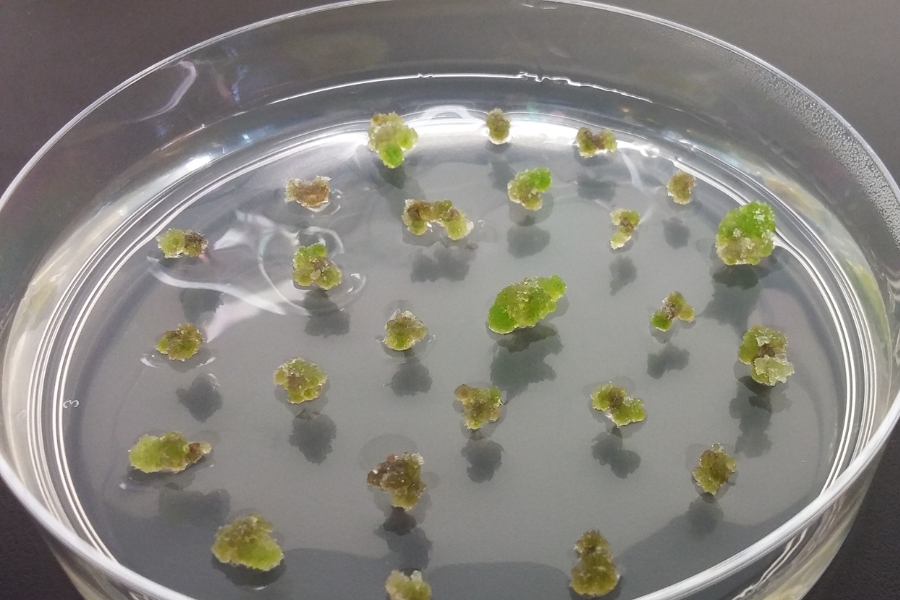Skip to content
 Unlocking the Future of Health-Promoting Ingredient Production with Plant Cell Culture As the demand for high-quality plant bioactives continues to rise in the supplement, food, and beverage industries, businesses are increasingly looking for innovative and sustainable methods to source these valuable compounds. Plant cell culture (or plant cell cultivation) is emerging as a cutting-edge solution […]
Unlocking the Future of Health-Promoting Ingredient Production with Plant Cell Culture As the demand for high-quality plant bioactives continues to rise in the supplement, food, and beverage industries, businesses are increasingly looking for innovative and sustainable methods to source these valuable compounds. Plant cell culture (or plant cell cultivation) is emerging as a cutting-edge solution […]
 Ayana Bio, the plant cell technology company dedicated to creating sustainable bioactives for consumer products, has received a grant from the National Center for Complementary and Integrative Health (NCCIH), part of the National Institutes of Health (NIH), to support Ayana Bio’s research into the production of saffron’s neuroprotective bioactives through plant cell cultivation.
Ayana Bio, the plant cell technology company dedicated to creating sustainable bioactives for consumer products, has received a grant from the National Center for Complementary and Integrative Health (NCCIH), part of the National Institutes of Health (NIH), to support Ayana Bio’s research into the production of saffron’s neuroprotective bioactives through plant cell cultivation.

 Ayana Bio, the plant cell technology company dedicated to creating sustainable bioactives for consumer products, today announced a seven-figure joint development agreement with Wooree Bio to develop plant cell-derived saffron and other important bioactive ingredients for health and wellness products for distribution in the South Korean market.
Ayana Bio, the plant cell technology company dedicated to creating sustainable bioactives for consumer products, today announced a seven-figure joint development agreement with Wooree Bio to develop plant cell-derived saffron and other important bioactive ingredients for health and wellness products for distribution in the South Korean market.
 Processed foods have long been associated with negative health effects, primarily due to the presence of additives and preservatives. However, a recent survey conducted by Ayana Bio, a plant cell technology company, revealed that taste, ingredient quality, and convenience are the primary factors influencing Americans’ choices and willingness to pay more for processed foods. In fact, 74% of the surveyed participants stated that they would try an ultra-processed food if it offered health benefits such as improved sleep, immunity, or energy levels.
Processed foods have long been associated with negative health effects, primarily due to the presence of additives and preservatives. However, a recent survey conducted by Ayana Bio, a plant cell technology company, revealed that taste, ingredient quality, and convenience are the primary factors influencing Americans’ choices and willingness to pay more for processed foods. In fact, 74% of the surveyed participants stated that they would try an ultra-processed food if it offered health benefits such as improved sleep, immunity, or energy levels.
 Taste, ingredient quality and convenience are the most important factors to participants when it comes to choosing and paying more for processed foods, according to a survey of 2,000 American adults conducted by plant cell technology company Ayana Bio.
Taste, ingredient quality and convenience are the most important factors to participants when it comes to choosing and paying more for processed foods, according to a survey of 2,000 American adults conducted by plant cell technology company Ayana Bio.
 In this instalment of The Cell Base’s ‘Start-up spotlight,’ we speak to Weslee Glenn, head of innovation at Ayana Bio, a US-based plant cell technology company and producer of sustainable bioactives for consumer products.
In this instalment of The Cell Base’s ‘Start-up spotlight,’ we speak to Weslee Glenn, head of innovation at Ayana Bio, a US-based plant cell technology company and producer of sustainable bioactives for consumer products.
 Ayana Bio, a plant cell technology company dedicated to creating sustainable bioactives for consumer products, has announced the appointment of Jim Hamilton to the company’s board of directors.
Ayana Bio, a plant cell technology company dedicated to creating sustainable bioactives for consumer products, has announced the appointment of Jim Hamilton to the company’s board of directors.
 Ayana Bio opens new laboratory to commercialise cultivated ingredients – July saw plant cell technology company Ayana Bio announce the opening of a new lab situated in Boston’s Seaport district in Massachusetts, US.
Ayana Bio opens new laboratory to commercialise cultivated ingredients – July saw plant cell technology company Ayana Bio announce the opening of a new lab situated in Boston’s Seaport district in Massachusetts, US.
 2023 has been a tough year for agrifoodtech startups, with high interest rates, inflation, fundraising challenges, banking scares, and souring investor sentiment in sectors from indoor ag to alt proteins, prompting pivots, layoffs, and business failures.
2023 has been a tough year for agrifoodtech startups, with high interest rates, inflation, fundraising challenges, banking scares, and souring investor sentiment in sectors from indoor ag to alt proteins, prompting pivots, layoffs, and business failures.
 The new year means new opportunities for wellness trends. After a year dominated by mental health discussions, COVID variants and weight-loss drugs hitting the market, we’re looking toward 2024 and what health topics will capture consumers most.
The new year means new opportunities for wellness trends. After a year dominated by mental health discussions, COVID variants and weight-loss drugs hitting the market, we’re looking toward 2024 and what health topics will capture consumers most.
 Jim Hamilton’s extensive experience in the health and wellness ingredient business will help catapult Ayana Bio to success with plant cell-derived bioactives.
Jim Hamilton’s extensive experience in the health and wellness ingredient business will help catapult Ayana Bio to success with plant cell-derived bioactives.
 The industry expert formerly served as president of DSM Nutritional Products USA, and CEO of OmniActive Health Technologies.
The industry expert formerly served as president of DSM Nutritional Products USA, and CEO of OmniActive Health Technologies.
 Ayana Bio has named Jim Hamilton, former President of DSM Nutritional Products USA and CEO of OmniActive Health Technologies, to the company’s board of directors.
Ayana Bio has named Jim Hamilton, former President of DSM Nutritional Products USA and CEO of OmniActive Health Technologies, to the company’s board of directors.
 Jim Hamilton’s extensive experience in the health and wellness ingredient business will help catapult Ayana Bio to success with plant cell-derived bioactives
Jim Hamilton’s extensive experience in the health and wellness ingredient business will help catapult Ayana Bio to success with plant cell-derived bioactives
 Jim Hamilton’s extensive experience in the health and wellness ingredient business willhelp catapult Ayana Bio to success with plant cell-derived bioactives
Jim Hamilton’s extensive experience in the health and wellness ingredient business willhelp catapult Ayana Bio to success with plant cell-derived bioactives
 Frank Jaksch has been chief executive officer of the startup Ayana Bio since 2022. Jaksch left the publicly-traded ingredient company ChromaDex, after building it from the ground up and taking the company public on the Nasdaq stock exchange. His background includes more than 25 years in life sciences, food and beverage, and dietary supplement consumer products.
Frank Jaksch has been chief executive officer of the startup Ayana Bio since 2022. Jaksch left the publicly-traded ingredient company ChromaDex, after building it from the ground up and taking the company public on the Nasdaq stock exchange. His background includes more than 25 years in life sciences, food and beverage, and dietary supplement consumer products.
 Plant cell technology company and producer of sustainable bioactives for consumer products, Ayana Bio, has launched its Plant Cell Advantage (PCA) ingredient portfolio.
Plant cell technology company and producer of sustainable bioactives for consumer products, Ayana Bio, has launched its Plant Cell Advantage (PCA) ingredient portfolio.
 Ayana Bio, the innovative company revolutionizing the production of sustainable bioactives for consumer products, has launched its novel Plant Cell Advantage™ (PCA™) ingredient lineup. This newly introduced suite of ingredients highlights the Dog Rose PCA™, Hedge Nettle PCA™, and Sage PCA™ as the freshest additions to its repertoire of health and wellness ingredients derived from plant cells.
Ayana Bio, the innovative company revolutionizing the production of sustainable bioactives for consumer products, has launched its novel Plant Cell Advantage™ (PCA™) ingredient lineup. This newly introduced suite of ingredients highlights the Dog Rose PCA™, Hedge Nettle PCA™, and Sage PCA™ as the freshest additions to its repertoire of health and wellness ingredients derived from plant cells.
 Ayana Bio has expanded its Plant Cell Advantage ingredient portfolio with the addition of plant cell-cultivated dog rose, hedge nettle and sage ingredients.
Ayana Bio has expanded its Plant Cell Advantage ingredient portfolio with the addition of plant cell-cultivated dog rose, hedge nettle and sage ingredients.
 Ayana Bio will debut Plant Cell Advantage™ Dog Rose, Hedge Nettle, and Sage ingredients to deliver the health benefits of high-quality plant bioactives
Ayana Bio will debut Plant Cell Advantage™ Dog Rose, Hedge Nettle, and Sage ingredients to deliver the health benefits of high-quality plant bioactives
 A recent survey found that consumers are willing to pay more for healthier ultra-processed foods, with younger generations and parents being the most interested.
A recent survey found that consumers are willing to pay more for healthier ultra-processed foods, with younger generations and parents being the most interested.
 More than half of Americans (57%) believe ultra-processed foods have a negative impact on health.
More than half of Americans (57%) believe ultra-processed foods have a negative impact on health.
 Nourishing the World is a captivating and thought-provoking show dedicated to exploring the fascinating and ever-evolving world of food and its future. Each week, we delve into various aspects of the food industry, culinary trends, cutting-edge technologies, sustainable practices, and innovative solutions that are shaping the way we produce, consume, and interact with food.
Nourishing the World is a captivating and thought-provoking show dedicated to exploring the fascinating and ever-evolving world of food and its future. Each week, we delve into various aspects of the food industry, culinary trends, cutting-edge technologies, sustainable practices, and innovative solutions that are shaping the way we produce, consume, and interact with food.
 A new survey by Ayana Bio broke down how consumers perceive the role of processed foods in their lives.
A new survey by Ayana Bio broke down how consumers perceive the role of processed foods in their lives.
 Food and beverage industry stakeholders are debating the role and importance of ultra-processed foods (UPFs) as consumers signal a willingness to try healthier versions of these products.
Food and beverage industry stakeholders are debating the role and importance of ultra-processed foods (UPFs) as consumers signal a willingness to try healthier versions of these products.
 New consumer survey conducted by Ayana Bio determines Americans’ openness and values related to ultra-processed foods
New consumer survey conducted by Ayana Bio determines Americans’ openness and values related to ultra-processed foods
 The company, which opened a lab in the Seaport last month, creates lab-grown plant materials for commercial use.
The company, which opened a lab in the Seaport last month, creates lab-grown plant materials for commercial use.
 Ayana Bio has opened a new “Plant Cell-to-Product Laboratory” in Boston Seaport to commercialise multiple cultivated wellness and nutrition ingredients.
Ayana Bio has opened a new “Plant Cell-to-Product Laboratory” in Boston Seaport to commercialise multiple cultivated wellness and nutrition ingredients.
 Boston Seaport‘s burgeoning biotech landscape welcomes a significant addition with the opening of a state-of-the-art laboratory by Ayana Bio. The new facility, dubbed the ‘Plant Cell-to-Product’ lab, is set to commercialize a range of cultivated ingredients, pushing the boundaries of biotechnology.
Boston Seaport‘s burgeoning biotech landscape welcomes a significant addition with the opening of a state-of-the-art laboratory by Ayana Bio. The new facility, dubbed the ‘Plant Cell-to-Product’ lab, is set to commercialize a range of cultivated ingredients, pushing the boundaries of biotechnology.
 Ayana Bio’s plant cell technology is a means to create plant materials without growing plants in the ground. As we reported previously, the plant cell cultivation technology starts by identifying the best plant cell lines—just like traditional plant breeding.
Ayana Bio’s plant cell technology is a means to create plant materials without growing plants in the ground. As we reported previously, the plant cell cultivation technology starts by identifying the best plant cell lines—just like traditional plant breeding.
 Ayana Bio has opened a new laboratory in Boston’s seaport district. The lab will serve as the company’s nucleus for formulating plant cell-cultivated production systems to formulate health, wellness and nutrition ingredients.
Ayana Bio has opened a new laboratory in Boston’s seaport district. The lab will serve as the company’s nucleus for formulating plant cell-cultivated production systems to formulate health, wellness and nutrition ingredients.
 Ayana Bio, the plant cell technology company, opened a new lab in Boston’s Seaport District. The new laboratory space supports the expansion of plant cell-cultivated ingredients into the dietary supplement, food & beverage, and sports nutrition markets.
Ayana Bio, the plant cell technology company, opened a new lab in Boston’s Seaport District. The new laboratory space supports the expansion of plant cell-cultivated ingredients into the dietary supplement, food & beverage, and sports nutrition markets.
 The new laboratory space supports the expansion of plant cell-cultivated ingredients into the dietary supplement, food & beverage, and sports nutrition markets
The new laboratory space supports the expansion of plant cell-cultivated ingredients into the dietary supplement, food & beverage, and sports nutrition markets
 Ayana Bio’s Plant Cell Advantage™ Lemon Balm and Echinacea-purpurea clean label gummy prototypes developed for SynBioBeta
Ayana Bio’s Plant Cell Advantage™ Lemon Balm and Echinacea-purpurea clean label gummy prototypes developed for SynBioBeta
 Dr. Sarah O’Connor, Director of Natural Product Biosynthesis, Max Planck Institute for Chemical Ecology, recognized for her significant contributions to scientific research
Dr. Sarah O’Connor, Director of Natural Product Biosynthesis, Max Planck Institute for Chemical Ecology, recognized for her significant contributions to scientific research
 Li et al.’s multi-pronged study generated high-quality genome sequence, chromatin assembly, single-cell transcriptomics, and single-cell metabolomics data that aided the discovery of a missing enzyme and transporter involved in the biosynthesis of anticancer molecules. This breakthrough will advance the field of plant-based medicine.
Li et al.’s multi-pronged study generated high-quality genome sequence, chromatin assembly, single-cell transcriptomics, and single-cell metabolomics data that aided the discovery of a missing enzyme and transporter involved in the biosynthesis of anticancer molecules. This breakthrough will advance the field of plant-based medicine.
 Ayana Bio has launched its first ingredients (lemon balm and echinacea) made via plant cell culture, an approach it claims can provide a consistent supply of botanicals without the supply chain headaches associated with traditional agriculture.
Ayana Bio has launched its first ingredients (lemon balm and echinacea) made via plant cell culture, an approach it claims can provide a consistent supply of botanicals without the supply chain headaches associated with traditional agriculture.
 Boston-based plant cell tech company Ayana Bio has announced the first-ever launch of plant cell-cultivated lemon balm and echinacea ingredients, to use in supplement formulations for sleep, mood, and immune support.
Boston-based plant cell tech company Ayana Bio has announced the first-ever launch of plant cell-cultivated lemon balm and echinacea ingredients, to use in supplement formulations for sleep, mood, and immune support.
 The process will yield products with the same bioactive composition of conventionally-grown botanicals and can directly replace their counterparts in food supplements for sleep, mood and immune support, says the plant cell technology company.
The process will yield products with the same bioactive composition of conventionally-grown botanicals and can directly replace their counterparts in food supplements for sleep, mood and immune support, says the plant cell technology company.
 Ayana Bio, the plant cell technology company making sustainable bioactives for consumer products, today announced the first-ever launch of plant cell-cultivated lemon balm and echinacea health and wellness ingredients, starting with the U.S. market. These products have the bioactive composition of conventionally-grown botanicals and can directly replace lemon balm and echinacea in dietary supplement formulations for sleep, mood and immune support.
Ayana Bio, the plant cell technology company making sustainable bioactives for consumer products, today announced the first-ever launch of plant cell-cultivated lemon balm and echinacea health and wellness ingredients, starting with the U.S. market. These products have the bioactive composition of conventionally-grown botanicals and can directly replace lemon balm and echinacea in dietary supplement formulations for sleep, mood and immune support.
 To understand how we can feed and nourish the planet and her people, Agatha Wong speaks with Frank Jaksch, CEO of Ayana Bio, to understand how ingredients play a crucial role in shaping the food and beverage industry. See p. 34-35 of the publication.
To understand how we can feed and nourish the planet and her people, Agatha Wong speaks with Frank Jaksch, CEO of Ayana Bio, to understand how ingredients play a crucial role in shaping the food and beverage industry. See p. 34-35 of the publication.
 The biological research company will cultivate polyphenol-rich cacao cells to add nutrition to a variety of food and drink items — but will not make candy.
The biological research company will cultivate polyphenol-rich cacao cells to add nutrition to a variety of food and drink items — but will not make candy.
 Plant cell tech firm Ayana Bio is pledging US$3 million to accelerate cacao bioactive production using cellular cultivation, part of a strategy to boost efforts in curbing the many challenges plaguing the cacao industry, such as climate change, deforestation and child labor.
Plant cell tech firm Ayana Bio is pledging US$3 million to accelerate cacao bioactive production using cellular cultivation, part of a strategy to boost efforts in curbing the many challenges plaguing the cacao industry, such as climate change, deforestation and child labor.
 Ayana Bio – one of a new wave of startups seeking to unlock the potential of plant cell culture in the food and nutrition industry – is turning its attention to cacao bioactives with a $3m investment it claims will also benefit the wider industry.
Ayana Bio – one of a new wave of startups seeking to unlock the potential of plant cell culture in the food and nutrition industry – is turning its attention to cacao bioactives with a $3m investment it claims will also benefit the wider industry.
 The initiative uses biotechnology to sustainably produce cacao bioactives and support genetic research to improve cacao plant varieties.
The initiative uses biotechnology to sustainably produce cacao bioactives and support genetic research to improve cacao plant varieties.
 With the last several years including a series of unprecedented events and challenges, Food Manufacture seeks the expertise of several food and drink leaders to find out what’s on the cards for 2023. Ayana Bio’s CEO, Frank Jaksch, on trends regarding health beneficial products.
With the last several years including a series of unprecedented events and challenges, Food Manufacture seeks the expertise of several food and drink leaders to find out what’s on the cards for 2023. Ayana Bio’s CEO, Frank Jaksch, on trends regarding health beneficial products.
 In an interview with the Orange County Business Journal, our CEO Frank Jaksch discusses how Ayana Bio accesses plant molecules that people have long co-opted as medicines and nutritional supplements. “Grow[ing] plants without having to grow plants,” complements traditional agriculture and bolsters supply chains hard hit by climate change and overharvest.
In an interview with the Orange County Business Journal, our CEO Frank Jaksch discusses how Ayana Bio accesses plant molecules that people have long co-opted as medicines and nutritional supplements. “Grow[ing] plants without having to grow plants,” complements traditional agriculture and bolsters supply chains hard hit by climate change and overharvest.
 As he takes the helm of the Ginkgo Bioworks spinoff, CEO Frank Jaksch said its plant cell culture tech to create bioactive compounds from ginseng, berries, cocoa and ginger could be a game changer.
As he takes the helm of the Ginkgo Bioworks spinoff, CEO Frank Jaksch said its plant cell culture tech to create bioactive compounds from ginseng, berries, cocoa and ginger could be a game changer.
 Plant cell technology company and Ginkgo Bioworks spin off Ayana Bio has appointed ChromaDex founder and former CEO Frank Jaksch as its new CEO.
Plant cell technology company and Ginkgo Bioworks spin off Ayana Bio has appointed ChromaDex founder and former CEO Frank Jaksch as its new CEO.
 Ayana Bio, the plant cell technology company making sustainable bioactives for consumer products, today announced the appointment of Frank Jaksch as the company’s Chief Executive Officer.
Ayana Bio, the plant cell technology company making sustainable bioactives for consumer products, today announced the appointment of Frank Jaksch as the company’s Chief Executive Officer.
 Health and wellness industry veteran will lead the company to scale sustainable bioactives using plant cell technology instead of agriculture.
Health and wellness industry veteran will lead the company to scale sustainable bioactives using plant cell technology instead of agriculture.
 Iridoids can be found in thousands of bioactives from plants. But the ones most often found in nature make up only about a fourth of what is possible in theory. The work presented in this text–from the laboratory of Prof. Sarah O’Connor, Ayana Bio’s Chief Science Advisor–opens up the possibility of producing iridoids with geometries not often found in nature. These new molecules may have unique and interesting properties.
Iridoids can be found in thousands of bioactives from plants. But the ones most often found in nature make up only about a fourth of what is possible in theory. The work presented in this text–from the laboratory of Prof. Sarah O’Connor, Ayana Bio’s Chief Science Advisor–opens up the possibility of producing iridoids with geometries not often found in nature. These new molecules may have unique and interesting properties.
 Prof. Sarah O’Connor and her team uncovered enzymes that complete the bioactive pathways of strychnine, diaboline, and brucine–molecules whose biosynthesis has eluded the broader scientific community for over 200 years. Her team then expressed the enzymes they identified in Nicotiana benthamiana to reconstitute the pathways in a living system as a case study to show that complex phytochemicals can be produced from a biotech chassis.
Prof. Sarah O’Connor and her team uncovered enzymes that complete the bioactive pathways of strychnine, diaboline, and brucine–molecules whose biosynthesis has eluded the broader scientific community for over 200 years. Her team then expressed the enzymes they identified in Nicotiana benthamiana to reconstitute the pathways in a living system as a case study to show that complex phytochemicals can be produced from a biotech chassis.
 Ginkgo Bioworks (“Ginkgo”), which is building the leading horizontal platform for cell programming, today announced the launch of Ayana Bio to enable a healthier future by harnessing bioactive compounds for use as complementary medicine to support human health and wellness.
Ginkgo Bioworks (“Ginkgo”), which is building the leading horizontal platform for cell programming, today announced the launch of Ayana Bio to enable a healthier future by harnessing bioactive compounds for use as complementary medicine to support human health and wellness.

By using this website, you agree to our legal policy and the storing of cookies on your device to enhance site navigation, analyze site usage, and assist in our marketing efforts. View our Privacy Policy for more information.I ACCEPT
 Unlocking the Future of Health-Promoting Ingredient Production with Plant Cell Culture As the demand for high-quality plant bioactives continues to rise in the supplement, food, and beverage industries, businesses are increasingly looking for innovative and sustainable methods to source these valuable compounds. Plant cell culture (or plant cell cultivation) is emerging as a cutting-edge solution […]
Unlocking the Future of Health-Promoting Ingredient Production with Plant Cell Culture As the demand for high-quality plant bioactives continues to rise in the supplement, food, and beverage industries, businesses are increasingly looking for innovative and sustainable methods to source these valuable compounds. Plant cell culture (or plant cell cultivation) is emerging as a cutting-edge solution […]  Ayana Bio, the plant cell technology company dedicated to creating sustainable bioactives for consumer products, has received a grant from the National Center for Complementary and Integrative Health (NCCIH), part of the National Institutes of Health (NIH), to support Ayana Bio’s research into the production of saffron’s neuroprotective bioactives through plant cell cultivation.
Ayana Bio, the plant cell technology company dedicated to creating sustainable bioactives for consumer products, has received a grant from the National Center for Complementary and Integrative Health (NCCIH), part of the National Institutes of Health (NIH), to support Ayana Bio’s research into the production of saffron’s neuroprotective bioactives through plant cell cultivation. 
 Ayana Bio, the plant cell technology company dedicated to creating sustainable bioactives for consumer products, today announced a seven-figure joint development agreement with Wooree Bio to develop plant cell-derived saffron and other important bioactive ingredients for health and wellness products for distribution in the South Korean market.
Ayana Bio, the plant cell technology company dedicated to creating sustainable bioactives for consumer products, today announced a seven-figure joint development agreement with Wooree Bio to develop plant cell-derived saffron and other important bioactive ingredients for health and wellness products for distribution in the South Korean market.  In this instalment of The Cell Base’s ‘Start-up spotlight,’ we speak to Weslee Glenn, head of innovation at Ayana Bio, a US-based plant cell technology company and producer of sustainable bioactives for consumer products.
In this instalment of The Cell Base’s ‘Start-up spotlight,’ we speak to Weslee Glenn, head of innovation at Ayana Bio, a US-based plant cell technology company and producer of sustainable bioactives for consumer products.  Ayana Bio opens new laboratory to commercialise cultivated ingredients – July saw plant cell technology company Ayana Bio announce the opening of a new lab situated in Boston’s Seaport district in Massachusetts, US.
Ayana Bio opens new laboratory to commercialise cultivated ingredients – July saw plant cell technology company Ayana Bio announce the opening of a new lab situated in Boston’s Seaport district in Massachusetts, US.  2023 has been a tough year for agrifoodtech startups, with high interest rates, inflation, fundraising challenges, banking scares, and souring investor sentiment in sectors from indoor ag to alt proteins, prompting pivots, layoffs, and business failures.
2023 has been a tough year for agrifoodtech startups, with high interest rates, inflation, fundraising challenges, banking scares, and souring investor sentiment in sectors from indoor ag to alt proteins, prompting pivots, layoffs, and business failures.  Jim Hamilton’s extensive experience in the health and wellness ingredient business willhelp catapult Ayana Bio to success with plant cell-derived bioactives
Jim Hamilton’s extensive experience in the health and wellness ingredient business willhelp catapult Ayana Bio to success with plant cell-derived bioactives  Plant cell technology company and producer of sustainable bioactives for consumer products, Ayana Bio, has launched its Plant Cell Advantage (PCA) ingredient portfolio.
Plant cell technology company and producer of sustainable bioactives for consumer products, Ayana Bio, has launched its Plant Cell Advantage (PCA) ingredient portfolio.  Ayana Bio will debut Plant Cell Advantage™ Dog Rose, Hedge Nettle, and Sage ingredients to deliver the health benefits of high-quality plant bioactives
Ayana Bio will debut Plant Cell Advantage™ Dog Rose, Hedge Nettle, and Sage ingredients to deliver the health benefits of high-quality plant bioactives  Nourishing the World is a captivating and thought-provoking show dedicated to exploring the fascinating and ever-evolving world of food and its future. Each week, we delve into various aspects of the food industry, culinary trends, cutting-edge technologies, sustainable practices, and innovative solutions that are shaping the way we produce, consume, and interact with food.
Nourishing the World is a captivating and thought-provoking show dedicated to exploring the fascinating and ever-evolving world of food and its future. Each week, we delve into various aspects of the food industry, culinary trends, cutting-edge technologies, sustainable practices, and innovative solutions that are shaping the way we produce, consume, and interact with food.  Food and beverage industry stakeholders are debating the role and importance of ultra-processed foods (UPFs) as consumers signal a willingness to try healthier versions of these products.
Food and beverage industry stakeholders are debating the role and importance of ultra-processed foods (UPFs) as consumers signal a willingness to try healthier versions of these products.  New consumer survey conducted by Ayana Bio determines Americans’ openness and values related to ultra-processed foods
New consumer survey conducted by Ayana Bio determines Americans’ openness and values related to ultra-processed foods  The new laboratory space supports the expansion of plant cell-cultivated ingredients into the dietary supplement, food & beverage, and sports nutrition markets
The new laboratory space supports the expansion of plant cell-cultivated ingredients into the dietary supplement, food & beverage, and sports nutrition markets  Ayana Bio’s Plant Cell Advantage™ Lemon Balm and Echinacea-purpurea clean label gummy prototypes developed for SynBioBeta
Ayana Bio’s Plant Cell Advantage™ Lemon Balm and Echinacea-purpurea clean label gummy prototypes developed for SynBioBeta  Dr. Sarah O’Connor, Director of Natural Product Biosynthesis, Max Planck Institute for Chemical Ecology, recognized for her significant contributions to scientific research
Dr. Sarah O’Connor, Director of Natural Product Biosynthesis, Max Planck Institute for Chemical Ecology, recognized for her significant contributions to scientific research  Ayana Bio has launched its first ingredients (lemon balm and echinacea) made via plant cell culture, an approach it claims can provide a consistent supply of botanicals without the supply chain headaches associated with traditional agriculture.
Ayana Bio has launched its first ingredients (lemon balm and echinacea) made via plant cell culture, an approach it claims can provide a consistent supply of botanicals without the supply chain headaches associated with traditional agriculture.  Ayana Bio, the plant cell technology company making sustainable bioactives for consumer products, today announced the first-ever launch of plant cell-cultivated lemon balm and echinacea health and wellness ingredients, starting with the U.S. market. These products have the bioactive composition of conventionally-grown botanicals and can directly replace lemon balm and echinacea in dietary supplement formulations for sleep, mood and immune support.
Ayana Bio, the plant cell technology company making sustainable bioactives for consumer products, today announced the first-ever launch of plant cell-cultivated lemon balm and echinacea health and wellness ingredients, starting with the U.S. market. These products have the bioactive composition of conventionally-grown botanicals and can directly replace lemon balm and echinacea in dietary supplement formulations for sleep, mood and immune support.  To understand how we can feed and nourish the planet and her people, Agatha Wong speaks with Frank Jaksch, CEO of Ayana Bio, to understand how ingredients play a crucial role in shaping the food and beverage industry. See p. 34-35 of the publication.
To understand how we can feed and nourish the planet and her people, Agatha Wong speaks with Frank Jaksch, CEO of Ayana Bio, to understand how ingredients play a crucial role in shaping the food and beverage industry. See p. 34-35 of the publication.  The biological research company will cultivate polyphenol-rich cacao cells to add nutrition to a variety of food and drink items — but will not make candy.
The biological research company will cultivate polyphenol-rich cacao cells to add nutrition to a variety of food and drink items — but will not make candy.  Ayana Bio – one of a new wave of startups seeking to unlock the potential of plant cell culture in the food and nutrition industry – is turning its attention to cacao bioactives with a $3m investment it claims will also benefit the wider industry.
Ayana Bio – one of a new wave of startups seeking to unlock the potential of plant cell culture in the food and nutrition industry – is turning its attention to cacao bioactives with a $3m investment it claims will also benefit the wider industry.  In an interview with the Orange County Business Journal, our CEO Frank Jaksch discusses how Ayana Bio accesses plant molecules that people have long co-opted as medicines and nutritional supplements. “Grow[ing] plants without having to grow plants,” complements traditional agriculture and bolsters supply chains hard hit by climate change and overharvest.
In an interview with the Orange County Business Journal, our CEO Frank Jaksch discusses how Ayana Bio accesses plant molecules that people have long co-opted as medicines and nutritional supplements. “Grow[ing] plants without having to grow plants,” complements traditional agriculture and bolsters supply chains hard hit by climate change and overharvest.  As he takes the helm of the Ginkgo Bioworks spinoff, CEO Frank Jaksch said its plant cell culture tech to create bioactive compounds from ginseng, berries, cocoa and ginger could be a game changer.
As he takes the helm of the Ginkgo Bioworks spinoff, CEO Frank Jaksch said its plant cell culture tech to create bioactive compounds from ginseng, berries, cocoa and ginger could be a game changer.  Plant cell technology company and Ginkgo Bioworks spin off Ayana Bio has appointed ChromaDex founder and former CEO Frank Jaksch as its new CEO.
Plant cell technology company and Ginkgo Bioworks spin off Ayana Bio has appointed ChromaDex founder and former CEO Frank Jaksch as its new CEO.  Ayana Bio, the plant cell technology company making sustainable bioactives for consumer products, today announced the appointment of Frank Jaksch as the company’s Chief Executive Officer.
Ayana Bio, the plant cell technology company making sustainable bioactives for consumer products, today announced the appointment of Frank Jaksch as the company’s Chief Executive Officer. 